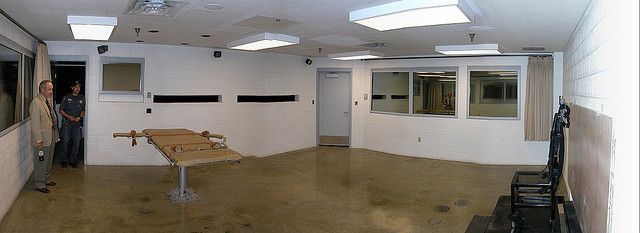Ohio Execution Stayed Over Organ Donation: Is Ronald Philips Dodging Execution Or Seeking A Last Good Deed?

Ohio Governor John Kasich was forced to make an unprecedented decision on Wednesday when death row inmate Ronald Philips requested that his organs be donated before his execution. Philips was due to receive lethal injection on Thursday, but now it has been postponed as doctors assess whether pre-execution or post-execution transplants are possible.
Philips was convicted and sentenced to death for the 1993 rape and murder of his then-girlfriend’s three-year-old daughter. And, after 20 years behind bars, it’s finally time for him to meet his fate. But it seems that Philips, who is now 40, is finding every option possible to delay his execution.
Just two weeks ago, Philips asked for his execution to be postponed because Ohio plans to use an untested combination of drugs for his lethal injection. The state used its last dose of the commonly used execution drug pentobarbital in September. Philips is set to be executed using a new process, which involves two drugs: the sedative midazolam and the painkiller hydromorphone. He challenged the new two-drug execution process in federal court, saying that the lethal cocktail would be cruel and unusual punishment. However the state decided to proceed with the execution despite the untested, possibly painful lethal injection cocktail.
Now, having exhausted all of his legal remedies, Philips has asked to donate his kidneys to his ailing mother and his other non-vital organs to patients in need. The state initially denied Philips request to donate, citing logistical issues and security risks. A spokeswoman said the prisons department had “reviewed the options and [had] determined that the department [was] not equipped to facilitate organ donation pre- or post- execution.” But Gov. Kasich said that postponing the execution, even if only for a little bit, would be worthwhile in determining whether Philips’ organs can be used to save a life.
“Ronald Phillips committed a heinous crime for which he will face the death penalty,” Kasich said, according to The Columbus Dispatch. “I realize this is a bit of uncharted territory for Ohio, but if another life can be saved by his willingness to donate his organs and tissues then we should allow for that to happen.”
If Philips is allowed to donate his organs, his donation will be the first of its kind. Death Penalty Information Center director Richard Dieter told The Inquisitr that death row inmate Steven Shelton was able to donate his kidney to his dying mother in 1995. But in that instance, Shelton was not due to be executed for quite some time. Philips' request just days before his execution, on the other hand, is unprecedented in the United States.
Skeptics believe Philips is using any avenue possible to delay his execution, but his attorney says that it’s actually his attempt at a final good deed.
"This was Ron's idea to do this, to try and do something good," said Phillips' attorney Timothy Sweeney, according to USA Today. "He was fully expecting to be executed Thursday, when he heard the news he said 'God is good.'"
If Philips is found to be a viable donor, the execution stay will allow time for the transplant procedures to be performed.



























